Yamaha LS9-32 Lightweight, compact digital mixers with advanced features and outstanding sound quality.
• 32 mono mic/line input and 4 stereo input
channels, expandable up to 64 channels in two layers.
• 16 mix buses, 8 matrix buses, plus stereo and mono buses with LCR mode.
• Compact and light enough for one person to move
and set up easily.(19.4 kg)
• Virtual Rack packed with effects and EQ for just about any processing requirements.
The Yamaha LS9-32 series consoles follow in the distinguished footsteps of the Yamaha PM1D, PM5D, and M7CL, expanding Yamaha's digital mixing console lineup for live sound and installations. The LS9 series
consists of the 32-mic/line input 64-channel LS9-32, and the 16-mic/line input 32 channel LS9-16.
While being compact and light enough for one person to move and set up easily, both models
include features that have been field-proven in previous Yamaha digital consoles as well as outstanding sonic quality. In addition to an extensive range of gating, compression, and equalization
capabilities, there's also a built-in USB memory recorder/player for recording or BGM playback, and other functionality that give you everything you need for small to medium scale live sound or
installed applications in remarkably compact, all-in-one consoles.
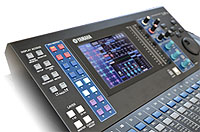 |
Ample Bus Capacity: 16 MIX, 8 MATRIX, and STEREO
The Yamaha LS9-32 features 16 MIX buses that can be used in either AUX (VARI) or GROUP (FIXED) mode, plus 8 MATRIX buses. The LS9-32 has 16 analog OMNI OUT connectors, while the LS9-16 has 8 OMNI OUT connectors.
Any of the
STEREO, MIX, and/or MATRIX buses can be assigned to the OMNI OUT connectors as required. Two Mini-YGDAI card slots in the LS9-32 and one in the LS9-16 additionally make it possible to expand audio input/output
capacity or add processing functions via the MY8-LAKE or Dugan-MY16 cards.
In addition to 4-band parametric EQ and two dynamics processors on every input, 4-band parametric EQ and one dynamics processor on every output bus offer significantly enhances sound control versatility. |
| |
|
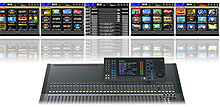 |
Virtual Rack with Top-quality Effects
There's no need for external effect racks with an LS9 console, both models provide a Virtual Rack that's packled with a complete range of effects that will cover just about any processing requirements. Up to 4
multi-effect processors can be used simultaneously, and you can use as many as 8 graphic equalizers.
The internal effect library offers 48 preset effects ... including the acclaimed REV-X reverb effects. In
addition to the standard 31-band single-channel GEQ units, you also have 2-channel Flex15GEQ units that allow up to 16 15-point GEQ units to be used simultaneously. Both GEQ types allow convenient band adjustment via
the console faders, and the channel ON keys can be used to instantly reset the corresponding band to zero boost/cut. |
| |
|
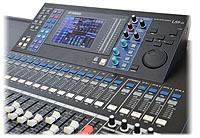 |
Intuitive Interface
Yamaha's popular Selected Channel interface allows smooth, intuitive access to the more detailed channel functions via a color LCD display and an array of logically arranged encoders. And no matter what display
is showing, you can instantly return to the main display by simply pressing the HOME key. This interface has been refined and proven over many generations of Yamaha digital mixing consoles. |
| |
|
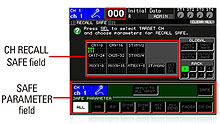 |
Recall Safe and Recall Focus...Right Down to Head Amp Gain
The Yamaha LS9-32 scene memory allows instant store and recall of all console parameters, including head amp gain. The Recall Safe function can be used to exclude specified channels from scene recall operations, making
it possible to leave sound effect or MC channels unaffected by scene recall, for example. There's also the Recall Focus function that makes it possible to specify which function group will be affected by scene
recall: head amp, virtual rack, input patch, output patch, input channel, or output channel. |
| |
|
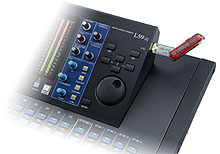 |
USB Memory Recording and Playback
The Yamaha LS9-32 includes a two-track audio recorder/player that uses a standard USB memory. That means you don’t need any extra equipment to record live or play BGM or sound effects. Record MP3 files at 96 128, or 192 kbps,
or play MP3, AAC, or WMA files at bit rates from 64 to 320 kbps. 44.1 kHz and 48 kHz sampling rates are supported. Transfer a freshly recorded live performance from the USB memory to a computer and broadcast via the
Internet in a matter of minutes! |
| Outline |
LS9-32 |
| Mixing capability |
Mixing channels |
64 Mono + 4 Stereo |
| GROUP |
16 MIX (Group/AUX) busses |
| AUX |
16 MIX (Group/AUX) busses |
| MAIN |
Stereo, Mono |
| MATRIX |
8 |
| Input channel functions |
HPF, Attenuator, 4-band PEQ, 2x Dynamics, Pan (LR or LCR with CSR) |
| Output channel functions |
Attenuator, 4-band PEQ, Dynamics |
| On-board processors |
4x GEQ, 4x GEQ/SPX (GEQ: 31-band or 2x Flex15), 66x Output port delay |
| I/O |
Mic inputs |
32 (Recallable) |
| Phantom power |
+48V DC; ON/OFF per channel |
| AD converter |
24-bit; 128-time over sampling |
| Line outputs |
16 Omni output |
| DA converter |
24-bit; 128-time over sampling |
| Digital I/O |
2tr in/out, USB Memory Recorder/Player |
| Expansion slots |
2x Mini-YGDAI (16-in/16-out); Possible to remote HA gain via slots |
| Control and others |
Ethernet, MIDI, USB (Storage/Key), Word clock I/O, Lamp |
| General specifications |
| Internal processing |
32bit, Accumulator: 58bit |
| Sampling frequency rate |
Internal |
44.1kHz, 48kHz |
| External |
44.1 kHz (-10%) to 48 kHz (+6%) |
| Signal delay |
Less than 2.5 ms (@48kHz) |
| Total harmonic distortion |
Less than 0.05% (20Hz-20kHz) |
| Frequency response |
0, +0.5, -1.5dB 20Hz-20kHz |
| Dynamic range |
DA: 110dB; AD+DA: 108dB |
| Hum & noise level |
Equivalent input noise |
-128dBu |
| Residual output noise |
-86dBu |
| Crosstalk |
-80 dB Adjacent Input Channels, Input to Output |
| Power requirements |
AC100-240V 50/60Hz |
| Power consumption |
170W |
| Dimensions |
W |
884mm; 34-13/16in |
| H |
220mm; 8-11/16in |
| D |
500mm; 19-11/16in |
| Net weight |
19.4kg; 42.8lbs |
| Accessories |
Owner’s Manual, AC Power Cord, Dust Cover |
|
|


